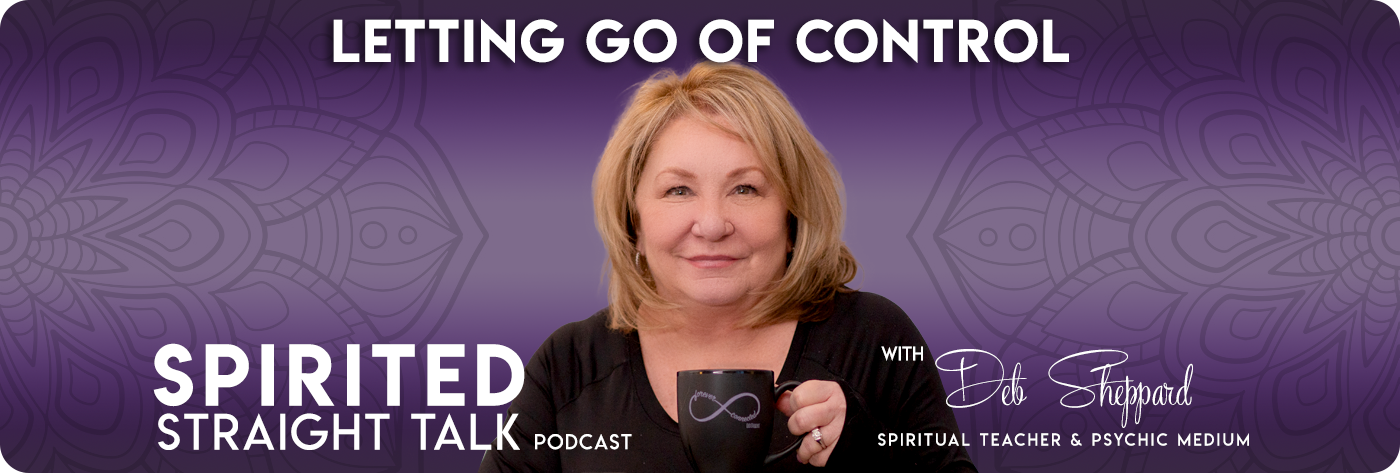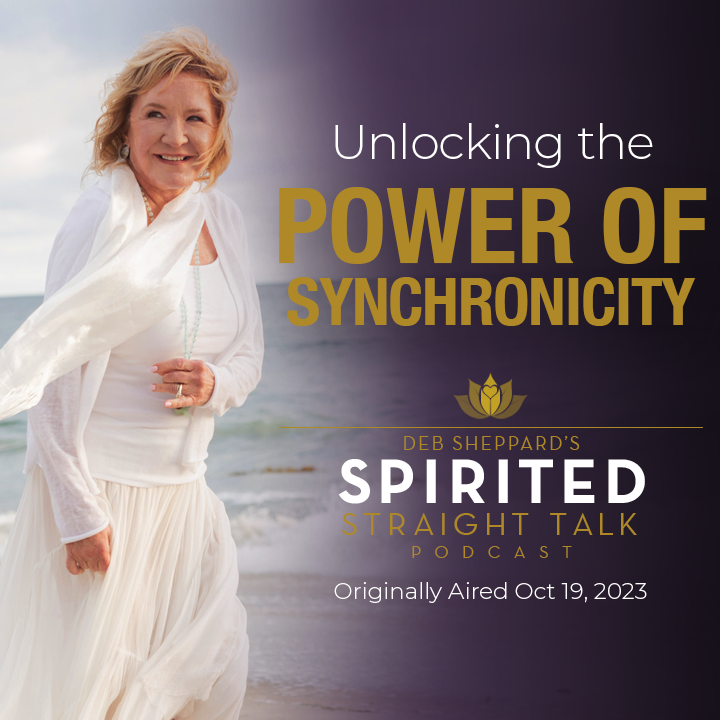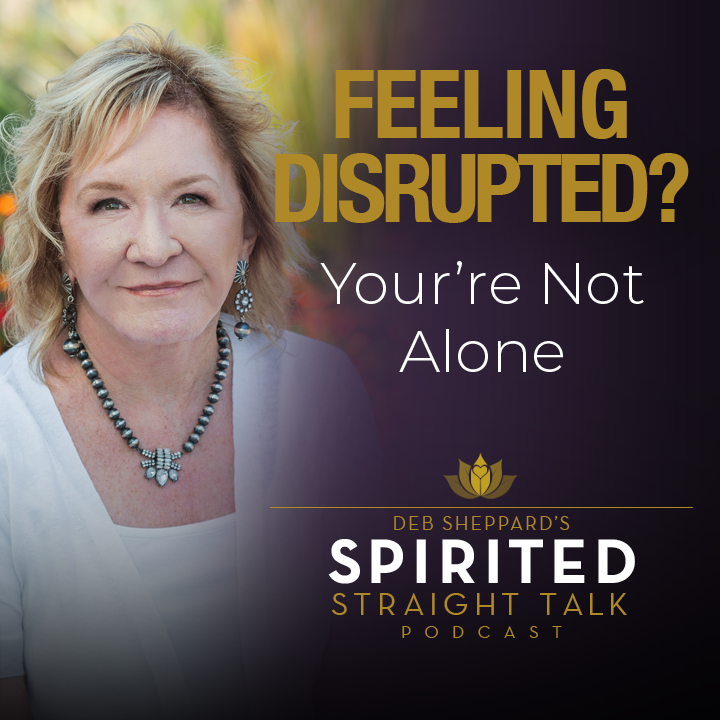
Letting Go Of Control (& Controlling People) Will Transform Your Life-Here’s Why
Deb (6s):
Welcome to spirited straight talk the ultimate podcast for anyone who is ready to live a life with intention and help from spirit. I am your host, Deb shepherd, spiritual teacher, medium and author hoping you open up to the whole enchilada or like, we like to say this soul enchilada, so you can truly make your soul rise. So let’s go! As always, I’m excited to be here. I with my dear loved one, Dana. Who helps me with this podcast.
Dana (46s):
Hello world.
Deb (46s):
This is sort of interesting topic today that I really wanted to address. Part of it is because what happens in my work and that’s control. People like to control.
Dana (58s):
Did you have something happen recently?
Deb (60s):
Yeah. , it’s not like it doesn’t happen. It does happen, but occasionally, I’ll do a reading and we educate people before a session because they’re nervous. They want to know certain things that are going to happen. They want to hear from certain people and you talk them through the process of what can happen in a session, but they still like to control it. It ends up in my opinion, sort of a failure in trying to be the messenger for somebody.
Dana (1m 33s):
Should we share the story of one of the ones that kind of brought this up?
Deb (1m 38s):
Yeah. Because you talked to the person in advance.
Dana (1m 42s):
I did. This happened several months ago, but yes, I call everybody in advance prior to their session. We go through how a session works and how your abilities work and how to basically not get in their own way.
Deb (1m 57s):
Correct.
Dana (1m 57s):
To make sure that all the messages that are coming through are received. So this person in particular, I know had one loved one that they wanted to talk to, but in prep we shared others may be the ones opening the door to the other side. So you really try to be open to the process, try to be open to whoever comes through, but this person did not want to hear from any other loved one, then the one that they had in mind.
Deb (2m 29s):
What happens is sometimes the other ones will come through and just say hi and let you know they were there.
Dana (2m 35s):
And then the show you that they’re with the other loved ones, right?
Deb (2m 39s):
Yeah. So they get come through and they say, hi, and then it’s all about the other individual they want to hear from. It really became difficult. This doesn’t happen often because most people are pretty open and they’re trying to go through the process, things like that, but it really brought up how many people want to control their life and they want to control an outcome. What I have found is that a lot of people take classes with me because they want to be more open to their guides. They want to be more open to hearing from their loved ones. But if you are a controlling person and you’re not willing to surrender to a process, it’s pretty much not going to work. That’s what we wanted to talk about today. If you’re in a controlling relationship or you feel that you’re the controller, this is really a topic to think about.
Deb (3m 24s):
Because sometimes we think that we know what’s best for us or best for somebody else. The universe has a bigger plan. I know that happened with me. For a couple reasons, I never thought I’d be doing this work. I never thought I would be with a woman. The universe goes, yeah, you may want to kind of control how your life is going to look, but guess what?
Dana (3m 50s):
You have, you have another thing coming.
Deb (3m 54s):
I can’t imagine not doing this work. I can’t imagine not being in with you and sharing our lives together. So if you’re that person that has to see things a particular way and only live that certain way, you’re really going to miss out what the universe has in store for you. You and I both believe that we came down here to this earth plane to learn. If you’re trying to make everything so safe and you’re trying to control everything, you’ll never have the full experience. So talking about control is usually based on total fear. When you’re trying to control every outcome around you. That means you’re fear based.
Deb (4m 33s):
I relate it to the fact that a lot of us, or most of us have insurance for our car, for our home, for our lives, for our health, whatever, because we don’t know what the future is going to hold or what’s going to happen, but we have a backup plan. That’s the same thing with trusting and surrendering, knowing that you always have a backup plan. That might mean looking at your past and what you’ve been through to know that when you move forward that you don’t have to control. Because people want to control because they don’t want pain anymore, or they control because, I want to control you because I don’t feel safe and I don’t trust you. So I’m going to control.
Deb (5m 13s):
Did you have a point?
Dana (5m 16s):
I was going to say, I know I’ve put myself in those positions where I felt like things were out of control. So there were certain things I could control. So I would try to control those things to feel safe.
Deb (5m 32s):
Correct. Those are two different things because you didn’t feel safe. It’s when people feel safe, but they want to control.
Dana (5m 38s):
Okay.
Deb (5m 38s):
So let’s say my life is fine, but I want to control everything. I want to control you because I don’t want nothing bad to happen. For you it was a safety issue. For a lot of people that have gone through trauma, I think, want to control because of that reason. However, if you really want the universe to open and bring you things, are you willing to be more open? I know when I’m doing readings or teaching a class, we just went through this one workshop where we were teaching souls contracts. As we’re getting into the beginning of it, it’s a six week class, they wanted to know the answers for the class.
Dana (6m 16s):
They want all the tools!
Deb (6m 19s):
And part of it is that there’s a process. When they get to the process, they go, okay, I get it. But it’s going through that process. Most of us don’t want to go through the process. I think when I’m doing the reading, like this one that we’re talking about, she just wanted to get to the point. She just wanted what she wanted and she didn’t want to go through what I had to do to get to that place. So she made the frustration. You like, I don’t want to say you control, but you like to kind of know what’s going to be happening. How we can plan it.
Dana (6m 47s):
Yeah. I’m a planner for sure. Which I think is probably a mild form of control, but I’m definitely, especially if I have a certain way that I envisioned things should look and sometimes I don’t know where that comes from. So I’m assuming it comes from my guides.
Deb (7m 6s):
And I also think that’s you’re controlling in the sense of I’m organizing something. So what people are paying for or where I’m stepping up to, we’re all, it’s all going to work versus you’re not trying to control me to do it a certain way.
Dana (7m 23s):
God, no, I wouldn’t know.
Deb (7m 25s):
So I think that’s a different between controlling versus planning. So if you’re a good organizer, you’re good planner. You want to make sure you know that the T’s are crossed. The I’s are dotted. That’s very different than controlling. Meaning. I want to know where you are. I want to know who you’re talking to, how long you’re going to be there. What are you eating? What are you doing on your internet? If you’re doing all those kinds of things, that means you’re not trusting either that individual or yourself where there’s been trust issues. Surrendering doesn’t mean giving up your power. Surrendering means I’m going to trust a process. You and I have seen this where we try to organize something and we keep hitting that wall.
Deb (8m 5s):
So instead of pushing through that wall, you’re going, okay. I need to sit back and breathe. Let’s see what the reasons are. Then all of a sudden, all this other stuff flows in and we’re like, Oh, that’s why it happened this way. That’s the difference between surrendering and trusting versus controlling and forcing something to happen when there’s such a bigger picture with it. Right? And I think with a lot of people, they try to control me during the reading and I’m like, that ain’t going to work for you, honey. You know, you can pay me three times the amount, but you can’t control what’s going to happen. And I know I’ve even had people come for me for sessions where they don’t want to look at anything alternative, like why I still want to work in this field, I only want to meet someone this way, I only want….
Deb (8m 49s):
And there so confined that the universe, or however you want to believe can never create an opportunity for something that’s even better than what you dreamed. I mean, you’re better than that. I wrote a letter to the universe I was appreciating what I had, and I said, Dana is this and this and this. I didn’t use the word Dana or female or male. Then when she showed up, it was like, okay, the universe had a better plan.
Dana (9m 19s):
So I’m wondering as we’re talking about control, I know people are probably listening, that may be in a situation where either number one, you don’t realize you’re being controlled or number two, you’re the controller or maybe a possibility of number three, you’re being controlled and what are the signs of that?
Deb (9m 42s):
Yeah. When I was thinking about this topic of control, I even said to you, I feel like we’re going to be talking about this topic about controlling relationships and you and I both have been in them. I felt like I was walking on eggshells and I didn’t realize it until I was away from it. You know?
Dana (10m 2s):
It gives you true PTSD for a long time.
Deb (10m 4s):
Yes. I kept thinking, I don’t want to upset the applecart in my previous relationship. I know you felt that way. We kept thinking, okay, I don’t want to do this or I don’t want to do that.
Dana (10m 15s):
What could set them off. It was always what could set them off, and you’re constantly trying to mitigate and manage that.
Deb (10m 28s):
I think that’s a big thing is you don’t see it in the beginning because they act like they so love you.
Dana (10m 34s):
And you’re the greatest thing
Deb (10m 36s):
You are the greatest thing, if you’re in that situation where you are the controller, first of all, take accountability and try to realize, you know, what is causing you to want to control? Why aren’t you trusting? Is there something in your past that has created you feeling like you have to control another person, another situation and kind of delve into that a little bit more. The other thing is if you’re in a relationship with a controller, then why?
Dana (11m 7s):
That’s the big question
Deb (11m 9s):
Are you in fear? Do you feel like everything has to be like you’re under a microscope, maybe that’s the best way to look at it. Are you feeling you’re always under a microscope? If you feel like you’re always in a microscope, I think it’s important to ask the question, is this the best relationship for you? I’m not telling you to divorce or leave or quit, but maybe finding your voice, maybe finding a way to say, you know what, I’m uncomfortable with this. This is how it makes me feel. Dana, you can relate to this, a lot of times when you ask the controlling person these questions, they turn it around so that you feel like you’re the problem.
Dana (11m 49s):
Yes, Yes.
Deb (11m 50s):
You know, I kept thinking I was the crazy one and…
Dana (11m 54s):
You question your own sanity.
Deb (11m 56s):
Yeah. Not that I don’t have my issues now that we’re in a padded room. The padded room is our podcast room, our studio. It’s really interesting that you start questioning like, well, maybe they’re right. The fact is, is your intuition is going to tell you when something doesn’t feel right in a relationship. If you’re having to change who you are, if you can’t be transparent, if you can’t question them, if they’re wanting to know everything that you’re doing or saying, or even trying to tell you that the relationships that you’re in are not good for you. It’s most likely because that relationship is questioning or showing you another way.
Deb (12m 36s):
So anytime that this person is thinking that they don’t trust you or your choices, please sit down and reflect on that. I think a lot of things to do could be, of course counseling is always number one, but really sit back and go, is this person a narcissist?
Dana (12m 55s):
I think that is a big thing. I know that narcissists a lot of times are very low on self-esteem and that’s why they exert control over other people. Do you feel like narcissists can be rehabbed?
Deb (13m 14s):
First thing I want to do is laugh. I think when you look at someone’s brain, cause you know, I talk about mental health. I don’t think that those things can be changed as much as they can be more aware of and say, yes, I am a narcissist, what do I do to change it?
Dana (13m 32s):
So the narcissist has to realize they are a narcissist? Am I a narcissist?
Deb (13m 38s):
No, thank God. I may be. I’ve been told I was one. But anyway..
Dana (13m 42s):
You are not! You are far from that
Deb (13m 44s):
What I think is that the person with that kind of controlling energy is never going to take accountability because that means their life has to change and they have to change and they’re not going to because they’ve controlled this world.
Dana (13m 59s):
Right.
Deb (13m 59s):
I know with my late husband, he had this idea of what the world should look like and anything outside of that was going to be very difficult for him. His reality became very small and that controlling piece was important for him to be able to have his own reality. And I had to put…
Dana (14m 19s):
You had to fit in that box
Deb (14m 20s):
I had to fit in that box. When I decided not to fit in that box anymore, that’s when everything began to crumble. If you’re going to deal with someone that’s really controlling, are you prepared then to deal with the fact of what’s going to happen to them. A lot of people, including myself, I’ve stayed in relationships that are that way because I was worried about what would happen to them.
Dana (14m 41s):
I think a lot of people that are in these, their partner tells them that they’re trying to help them.
Deb (14m 53s):
Correct. Or they just love you.
Dana (14m 55s):
Or they make it seem like it’s a benefit to you. That they are that controlling.
Deb (15m 1s):
And then if you question, like I don’t need your control, it can be turned against.
Dana (15m 7s):
So you’re protecting you.
Deb (15m 8s):
They’re protecting you. I think a lot of this is not to kind of like go crazy. Saying, Oh my God, I can never get out of this. I think the first thing is being aware. Being aware that you’re being controlled or that you are a controlling individual. Are you trying to control the universe, which we can’t. If you want to be intuitive, if you do want that authentic life, if you do want to be transparent, what parts of your life are controlled? Is it your thoughts? Is it your fears? Is it the individual and how do you want to get out of it? I don’t think there’s one correct way. I think for me it took a while, and then I kind of went, yeah, this is it.
Deb (15m 49s):
I’m done.
Dana (15m 50s):
I was the same. I think when I finally realized it was so defined and I knew it was happening. I knew that there was that piece of it. I think on the flip side I became controlling of what I felt I could control. So I’m being controlled on one end and then I become controlling on the other, which I think is almost like a defensive response, I will say, you’re trying to make yourself feel better in a way.
Deb (16m 25s):
Well, it’s that pendulum that we’re trying to find that balance. And we go from being controlled to trying to control because that’s where you’re going to feel safe. Then you try to go, I need the balance and…
Dana (16m 37s):
Drawing that line becomes, like for me, it was like one day I was open to fixing things. The next day I was completely done.
Deb (16m 48s):
Correct.
Dana (16m 48s):
There was no going back. There was no changing. My mind was just set and I was done. I don’t know how you feel.
Deb (16m 55s):
Yeah, that’s it too. It was just, there was the one day. I know we had a class a while back where the lady talked about her husband bought a tomato plant.
Dana (17m 6s):
Oh yes.
Deb (17m 6s):
Basically she knew her marriage was over, but she wasn’t ready to go there. He had bought a, and she told me I could share this story. But he bought a tomato plant, was taking really good care of it. Then he stopped. So she started taking care of it and watching the tomato plant.
Dana (17m 22s):
The tomato plant almost died, right?
Deb (17m 24s):
Yeah so she took over, then she let it go and he took over and then he stopped again. That’s when she finally, we all have that moment. She finally said, this marriage is over because that’s how their marriage was working. They weren’t on the same page. They weren’t doing the same thing. They both nurtured at different times. It wasn’t a collective energy. I think we all have that moment, that breaking moment where we’re done. I know for me, my husband had bought one more computer and I was like, that was the straw. You finally get that. But when you have a controlling person, you have to be able to have that inner strength to be able to stand in your power, to have that voice to say I am done.
Deb (18m 6s):
What I think is truly important is having a support system if you’re going to go through that because I don’t think you really had a support system.
Dana (18m 18s):
Not really. I would say my aunt was a good support system for me. I have a friend who I’ve recently reconnected with that was a support system at the time. But then, you go through a process where people may not understand exactly where you’re at and, you may disconnect from them, which is, I think what I had to do for self-preservation at the time, but you that’s when you and I connected. I started to really delve into a lot of my true feelings, about many different things.
Dana (18m 58s):
My other relationships changed for a short time. Now I’m kind of circling back with them and, and saying, Hey, this is what I was going through at the time. This was where I was and where I am now. Telling them how important they are to me now. Right?
Deb (19m 16s):
I think the word self preservation is a key word in this because control means I want to preserve who I am. Leaving control and surrendering and learning to trust is another way of learning, how to be your true self. I think that everyone can have the right words for it or explain what they’re going through, like what you did as well. Then you finally go, Oh yeah, I don’t have to live that way anymore. I think that’s what these podcasts are about or what our classes are about. Everything that we write is, you may have this experience, but it doesn’t have to be the rest of your life. You get to live a different way.
Dana (19m 54s):
Yeah. It doesn’t need to define you forever.
Deb (19m 57s):
It’s a part of your life. I guess in conclusion here is really looking at what control looks like for you. If you’re the controlling person, if you want to control the outcome of your life, if you’re in a controlling relationship, whatever that looks like in your life to really focus on where does it come from? Does it work in your life?
Dana (20m 22s):
If somebody is trying to open up their intuition and they’re realizing right now in this podcast that they are that controlling force, they don’t allow themselves to open up their intuition. How would you tell them to deal with that?
Deb (20m 39s):
You know, I always say, take the baby steps. Start small, start looking at why you’re controlling something. If you’re working with people and you’re asking way too many questions about a meeting and you want to fully have control, or you want to take control, or you want to take it a different way. Why are you doing that? If you’re in a relationship with your children or with your partner or your family, are you trying to control everything about it? Are you allowing other people to step up? I think the people that think that they’re leaders, that like to control are truly not leaders.
Deb (21m 19s):
It’s more dictatorship.
Dana (21m 21s):
Okay.
Deb (21m 22s):
If you’re not allowing other people to step up, you’re not learning, you’re not seeing other people’s wisdom. They may have a better idea. I’ve learned that even with you, you’ve taken over so much of things that like, Oh yeah, we can do it this way. Well, COVID has taught us that we can’t meet in person, but you gotta learn to teach it differently. I had to release control of how I was teaching because I had the way I did it.
Dana (21m 46s):
You know, here’s my thing, my opinion, if somebody knows how to do it better, please tell me because life is hard enough. I just don’t feel like, especially at this point in my life, maybe when I was younger, I wanted more specific control of things surrounding me because of my circumstances as a younger child. But now I’m like, gosh, even our amazing friend, Emily who has helps us with the podcast and the classes and marketing and stuff. I’ve been in marketing for a long time, but you’re still so happy to say, Hey, can you please tell me how to do this better?
Dana (22m 31s):
Because I don’t need that type of…
Deb (22m 33s):
And I think it’s the pendulum you were talking about. I know I was raised by controlling parents, which I still love they’re in my life still, but I went the opposite with my kids, which I think, if I have more kids, which that won’t happen, but you know that in between where I could have still been a little bit more assertive, but a little bit more relaxed with it. Our experiences do change how we perceive life and how we take on life. So really this is about looking in the mirror, having a reflection of, what does control mean to you and what does surrendering meaning to you?
Deb (23m 13s):
Are you going to learn when you control?
Dana (23m 16s):
I think that was our soul enchilada!
Deb (23m 19s):
That’s our soul enchilada!
Dana (23m 20s):
We love you guys!
Deb (23m 22s):
Take care. Thanks for joining us once again.
Dana (23m 23s):
Thank you for joining us for this episode of spirited. Straight talk. If you enjoy the show, make sure you subscribe so that you get notified of new shows. We’d also love it if you’d leave us a review and let’s connect, visit Deb shepherd.com for more insights support workshops, and to book a session with Deb, plus enter to get a free reading with Deb. All you have to do is sign up for the list and you’ll automatically be entered. Just go to Deb sheppard.com. That’s Deb S H E P P a R d.com.



